【TNF Journal】Business’s New Relationship with Disabilities (Part 3) Promoting “Awareness” Among Leaders is Also Essential
Building an Inclusive Organization in the NTT Group

Key Points in this Article
- What we refer to as “disabilities” in fact include various types of disabilities. Efforts at recruitment and retention of employees with disabilities require one-on-one care and communication.
- The NTT Group is deepening its employees’ understanding of people with disabilities through training where people with disabilities are invited as lecturers.
- It is important to promote even among leaders at the helm of companies an “awareness” of disabilities as something relatively common.
Reporting: The Nippon Foundation Journal Editing Department
Focusing on the employment of people with disabilities at companies and the development of products and services for people with disabilities, we will introduce some outstanding initiatives in this series. We would like our readers to join us in considering what kind of viewpoints and ideas are necessary for creating a society where everyone with or without a disability can participate.
Conducting the interviews for this article were members of the Working Group*, a group formed by The Nippon Foundation to accelerate the social participation of persons with disabilities. In Part 3 of this series, we introduce initiatives of the NTT Group (a new window opens), whose management policy is to solve social issues through information and communications technology (ICT) and innovation.
- * A group formed to research and formulate plans for specific issues.
The NTT Group established NTT Claruty Corp. (a new window opens) as a special subsidiary(*1) to review its operations for hiring persons with disabilities, provide comprehensive support in recruitment activities as well as retention assistance, and promote diversity and inclusion(*2) in the group as a whole.
Furthermore, in October 2020, the NTT Group entered into a capital alliance with Ory Laboratories, Inc. (a new window opens), which promotes the social participation of people with various disabilities through a variety of initiatives including the development of OriHime-D, a remote control avatar robot. This capital alliance has been widely reported on.
- *1A company established to promote employment and stability in employment of people with disabilities.
- *2Creating a society where everyone can play an active role by respecting and acknowledging diversity of race, gender, age, and the presence or absence of disabilities.
For this article, we interviewed Ms. Madoka Ikeda, Head of Diversity and Inclusion at NTT, Mr. Naoki Tanabe, Manager, and Ms. Yuko Ito, an employee with a disability.
Attending to each employee’s disability to determine what support is necessary
Yamada: I am Yuhei Yamada of the Working Group. First of all, please tell us about how many people with disabilities work in the NTT Group.
Ms. Ikeda: At present, we have about 3,990 employees with disabilities out of 180,000 group employees in Japan.
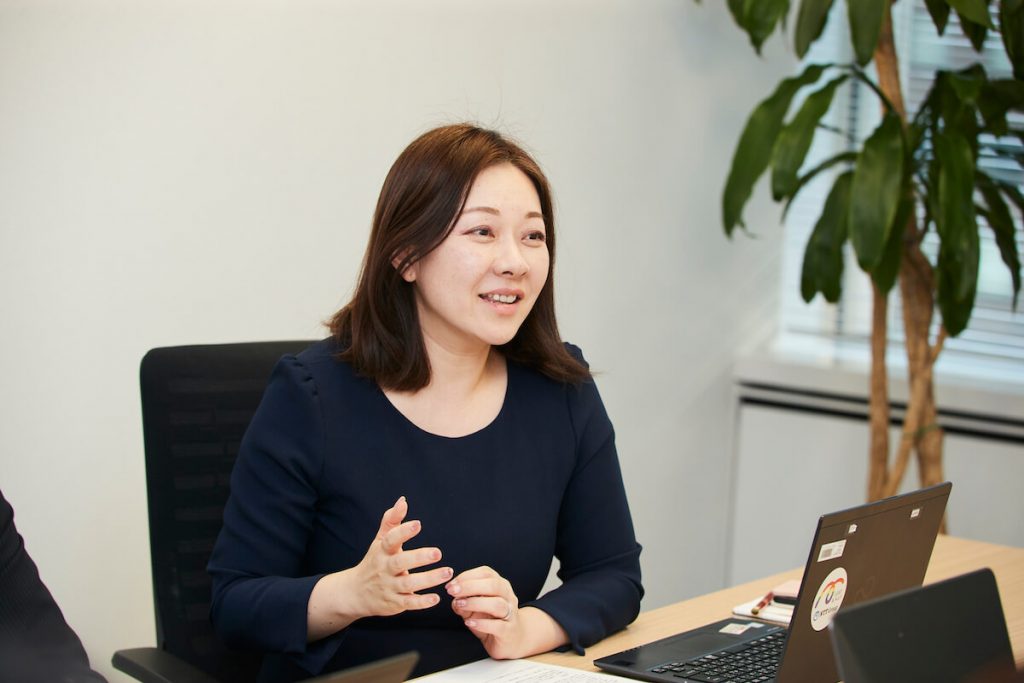
Yamada: A look at the current situation in employment of people with disabilities shows that even after their recruitment, difficulty in retention is an issue.
Mr. Ikeda: We feel that this issue is also our problem. To address this, we have been devoting efforts to creating a pleasant workplace environment where people with disabilities are able to work on a long-term basis. For example, in addition to making adjustments in “hard” areas such as installing toilets that can accommodate wheelchairs and introducing software that reads out text, we also believe providing support in “soft” areas such as having one on one meetings between our counselor staff and employees with disabilities, and also together with their supervisors on a regular basis. In a nutshell, what we refer to as “disabilities” encompasses various types of disabilities. In each group company, we are making efforts with each of our employees with disabilities on an individual basis, taking into consideration their current circumstances, what care they should be given, and what changes in symptoms can be expected in the next few years.
Yamada: I happen to have a mental disability, and disabilities are often difficult to discern from appearances, but I understand that you have an environment here where people keep close tabs on each person.
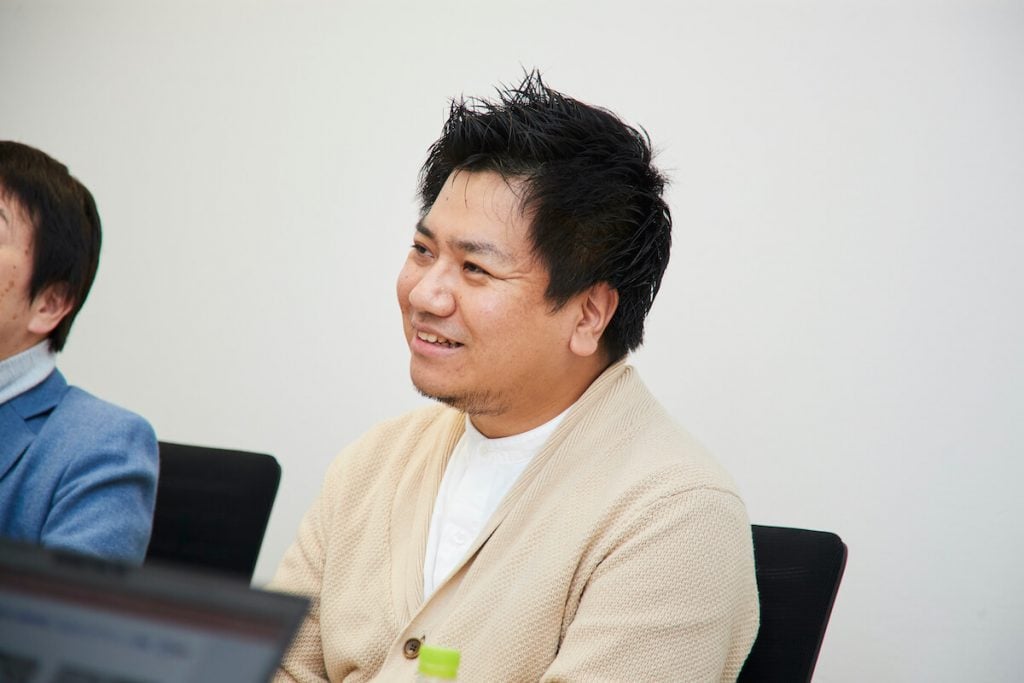
Okuhira: I am Masako Okuhira from the Working Group. I heard that the NTT Group conducts employee training for understanding disabilities. What does the training involve?
Mr. Ikeda: We have what is called “Barrier-free Training of the Mind” (a new window opens) where employees with disabilities are the instructors. Participants deepen their understanding of disabilities through hands-on experiences such as moving around in a wheelchair, experiencing what it’s like not to be able to see or hear, and listening firsthand to people with disabilities speak about the difficulties they encounter.
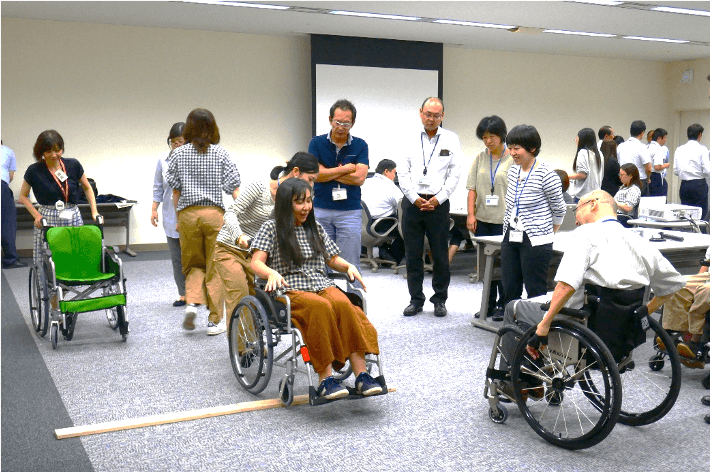
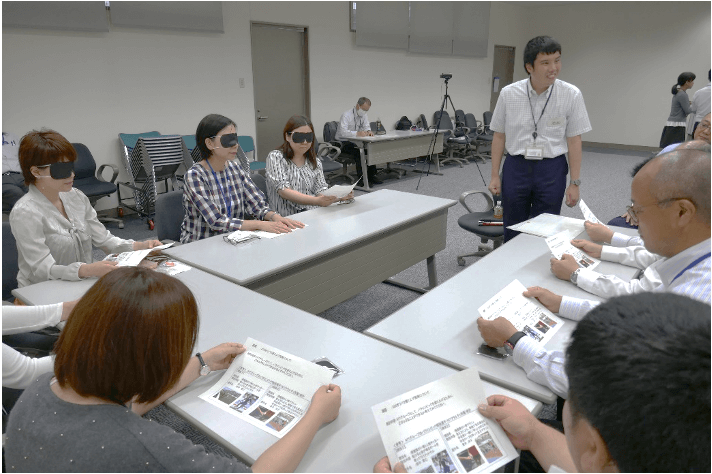
Okuhira: Another interesting initiative at NTT is the introduction of the OriHime-D robot. We understand that this robot allows people who have severe disabilities and only partial physical mobility to communicate with people remotely from home. How many people are currently working remotely?
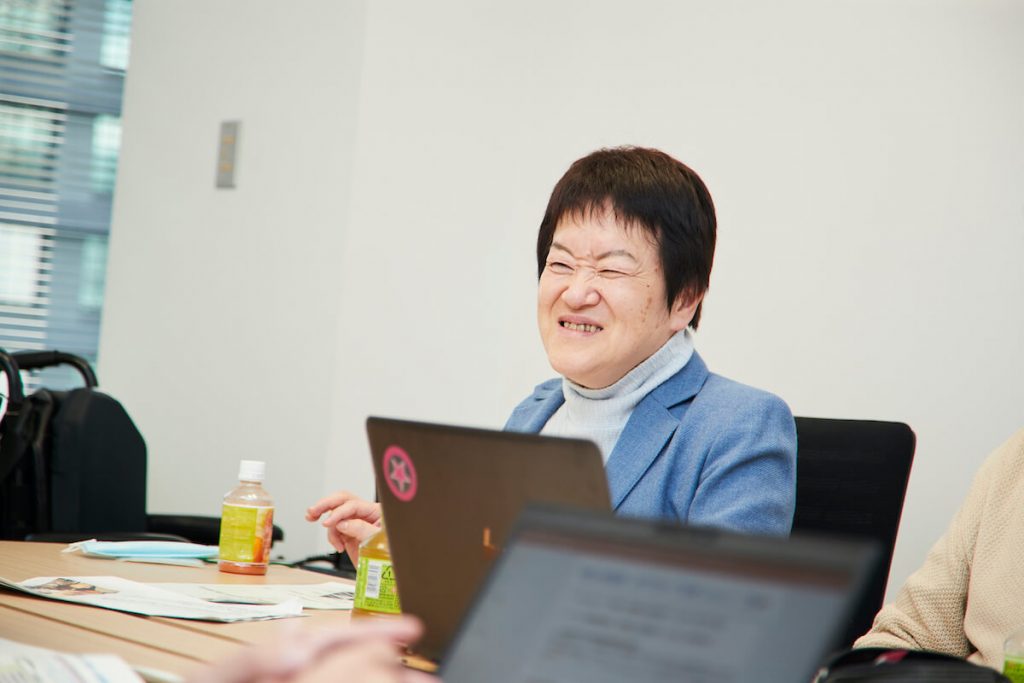
Mr. Tanabe: There are four at present. All four work at reception, and their caring and cheerful customer service is highly regarded by customers. I feel that their performance underscores the reality that there are many highly skilled people in the world who are deprived of the opportunity to work due to their disabilities. I would now like you to hear from Ms. Ito who actually uses OriHime-D to work remotely.
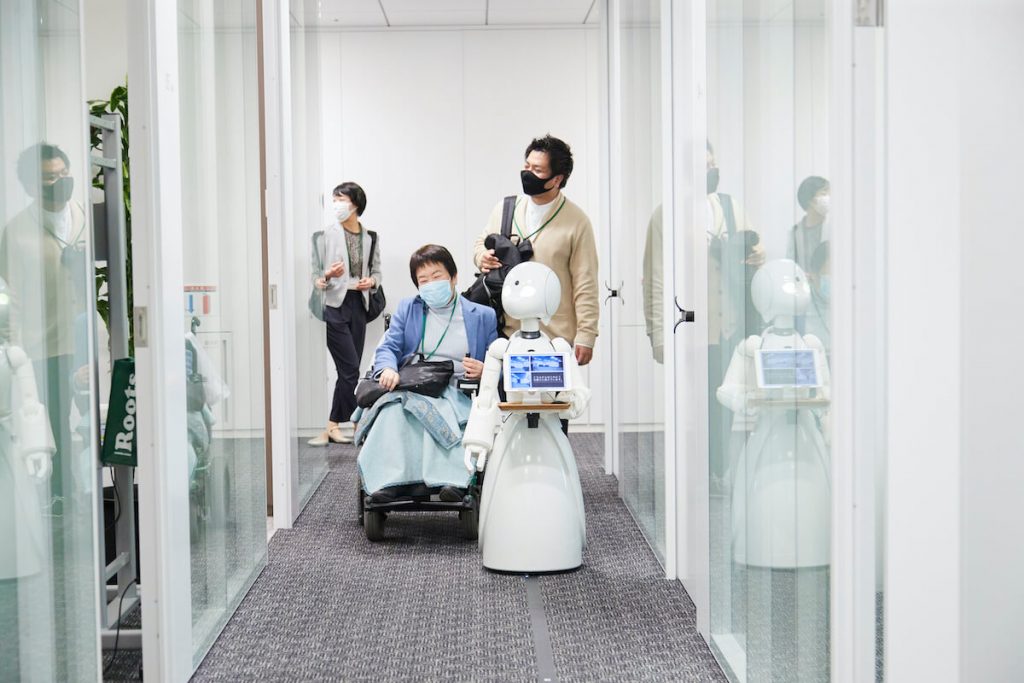
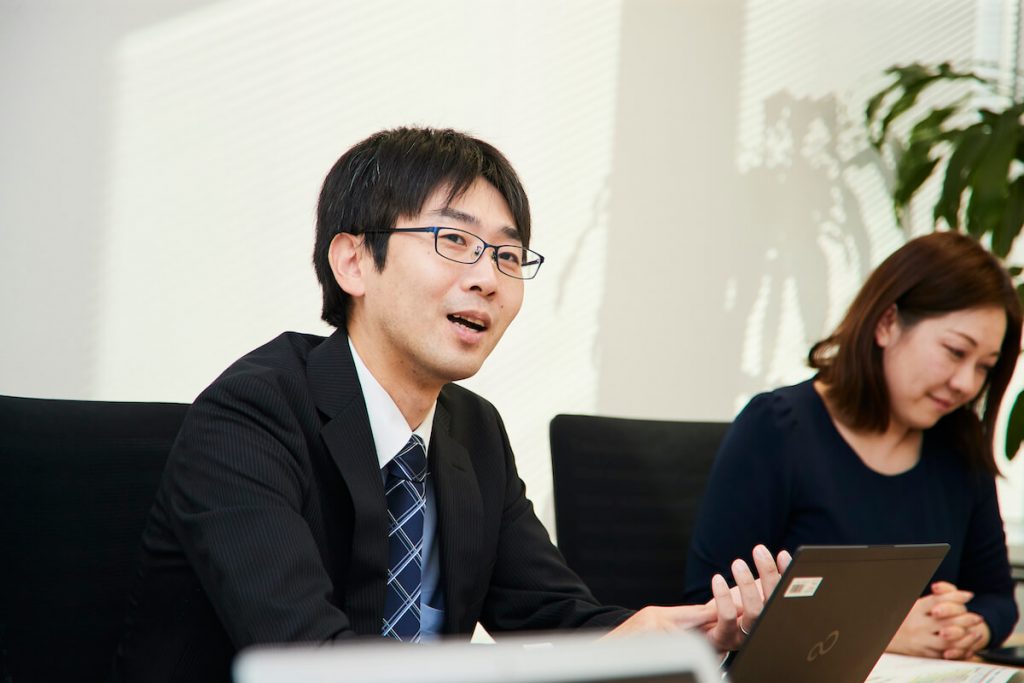
Office work via a remote robot. Potential to expand work styles
Yamada: Ms. Ito, I understand that you are working remotely from Aichi Prefecture using OriHime-D. Please tell us how it came about that you began working for the NTT Head Office.
Ms. Ito: I participated in the Avatar Robot Cafe (a new window opens), a social experiment conducted by Ory Laboratories (a new window opens) in October 2019, in which people with disabilities worked using OriHime-D. Following on from there, Ory Laboratories introduced me to my current work.
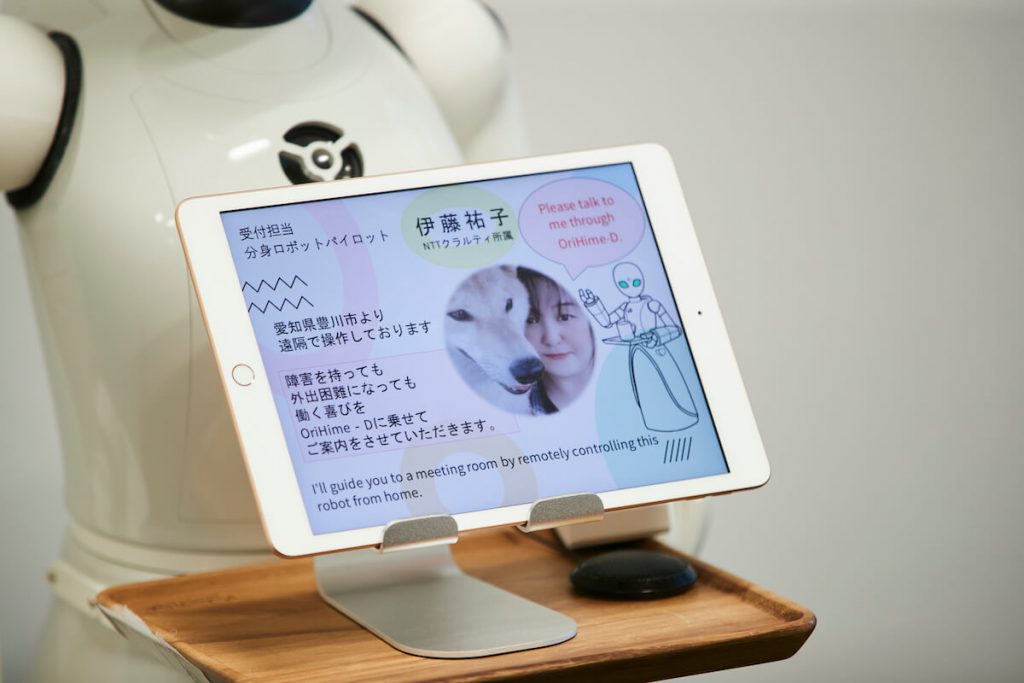
Okuhira: Ms. Ito, what made you decide to take part in the Avatar Robot Cafe?
Ms. Ito: A few years ago, I was involved in an accident where I suffered an injury to my spinal cord. Since then, dysfunction of both my lower limbs has confined me to a wheelchair. Over the years, as I became less mobile, it became more and more difficult for me to work outside. Wondering whether I would grow old just staying at home like this, I felt like giving up. At that time, I became aware of the initiatives of Ory Laboratories via the internet, and I felt that this was something I could do.
Yamada: I see. Now that you are actually working at NTT Head Office, what aspects of your work do you find rewarding?
Ms. Ito: Having a robot guide, customers eases their tension before meetings, and it’s very rewarding to see customers enter the conference room with a smile. The fact that I can work in Tokyo while remaining at my home in Aichi Prefecture and at the same time can play even a small role in society makes me very happy.
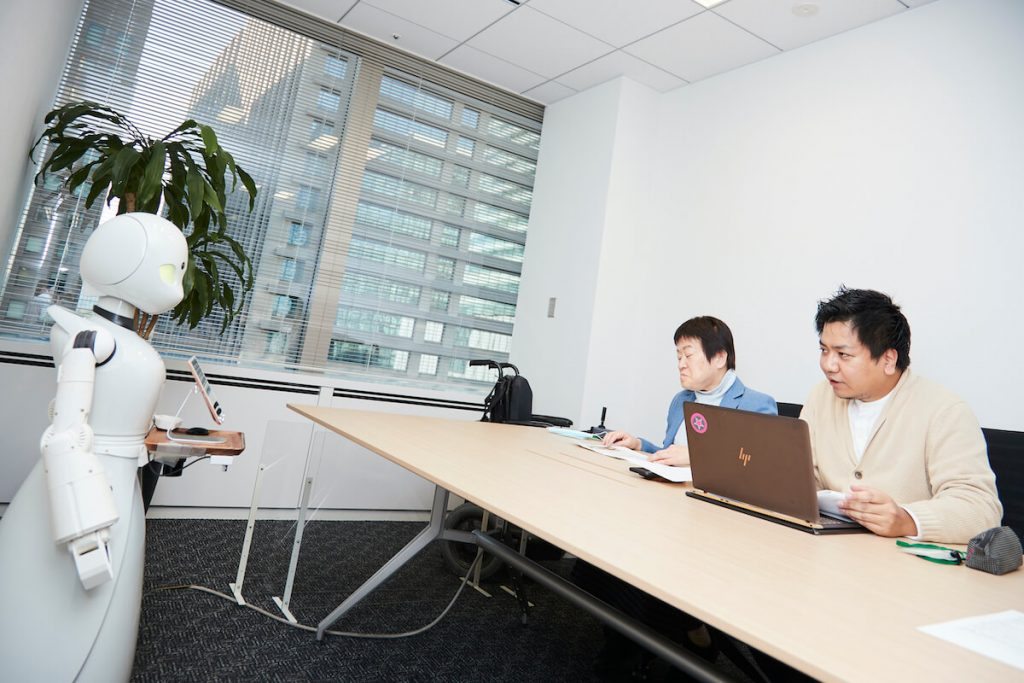
Okuhira: OriHime-D, being a robot, also seems to serve as a kind of ice breaker. Ms. Ito, what kind of consideration does the company show in regard to your disability?
Ms. Ito: During my online interview, I was asked in detail about the extent and condition of my disability. On that basis, the company has shown considerable care. They coordinate my work so that I do not work long hours, and if OriHime-D suddenly becomes inoperable due to a network or other problem, somebody will immediately follow up the situation. In addition, the company arranges opportunities for me to interact with senior employees within the company, and I can enjoy working with a sense of security.
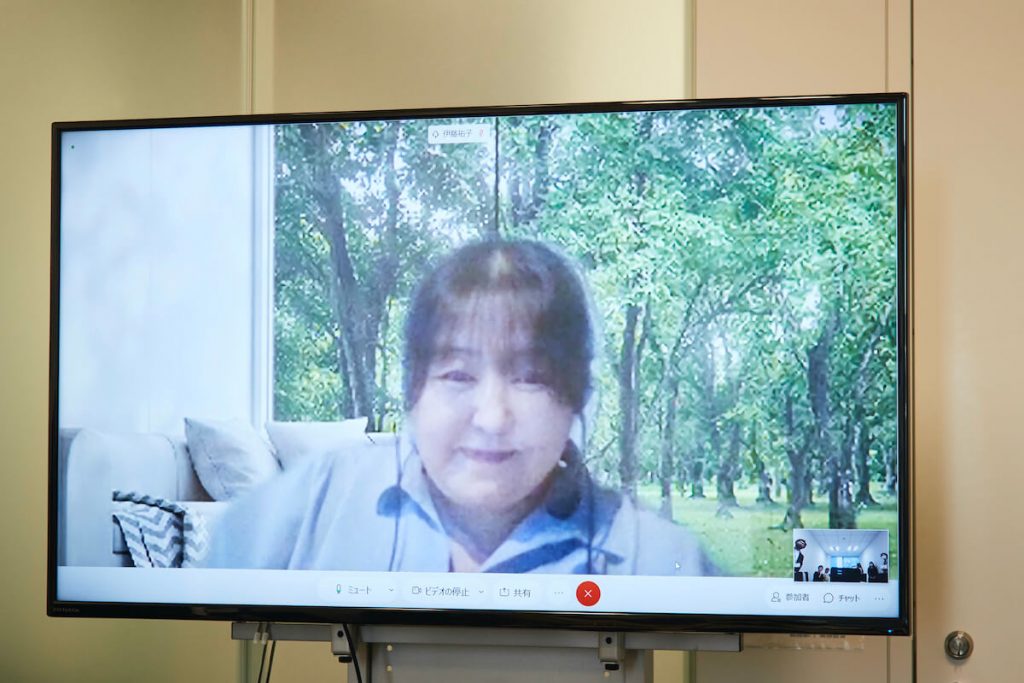
Yamada: We can see that you enjoy your work. Do you think you can send a message to others with disabilities who have a similar desire to work?
Ms. Ito: I believe that working for the sake of others is a significant motivation in life. Although people with disabilities depend on others and tend to rely on their generosity, the idea of wanting to do something for the sake of others makes us feel those people also need us. I hope that in the future there will be more and more examples of people with disabilities engaging in work, and that their lives as individuals will shine.
Aiming to create an organization where people with and without disabilities work together for granted
Yamada: Please tell us about the organization and the society the NTT Group is aiming for. I understand that the NTT Group is also a member of The Valuable 500 (a new window opens), a global initiative promoting the participation of persons with disabilities in business. Can you provide us with details?
Ms. Ikeda: The NTT Group has affiliated companies in 90 countries around the world but it has been difficult until recently to act in concert in the international promotion of participation of persons with disabilities due to differences in laws and systems in each country. The NTT Group decided to join The Valuable 500 with the view that it would be a good opportunity to clarify the NTT Group’s policies both in Japan and globally.
Yamada: Since joining The Valuable 500, have you been involved in any initiatives?
Ms. Ikeda: While investigating conditions in each country, we have been exploring possible activities which could be done in common as global. We believe that staff training is the first step for promoting the disability inclusion. At present we are considering efforts to promote understanding of disabilities and training in unconscious bias.* When you just show people data and tell them that 10% of the population are people with disabilities, they do not feel this pertains to people in their immediate environment as their personal matters. I believe that, through training, it is important to make employees aware of their own individual preconceptions and prejudices concerning “disabilities” and make them take actions on their own to change our organization and society.
- * Unconscious beliefs and biases
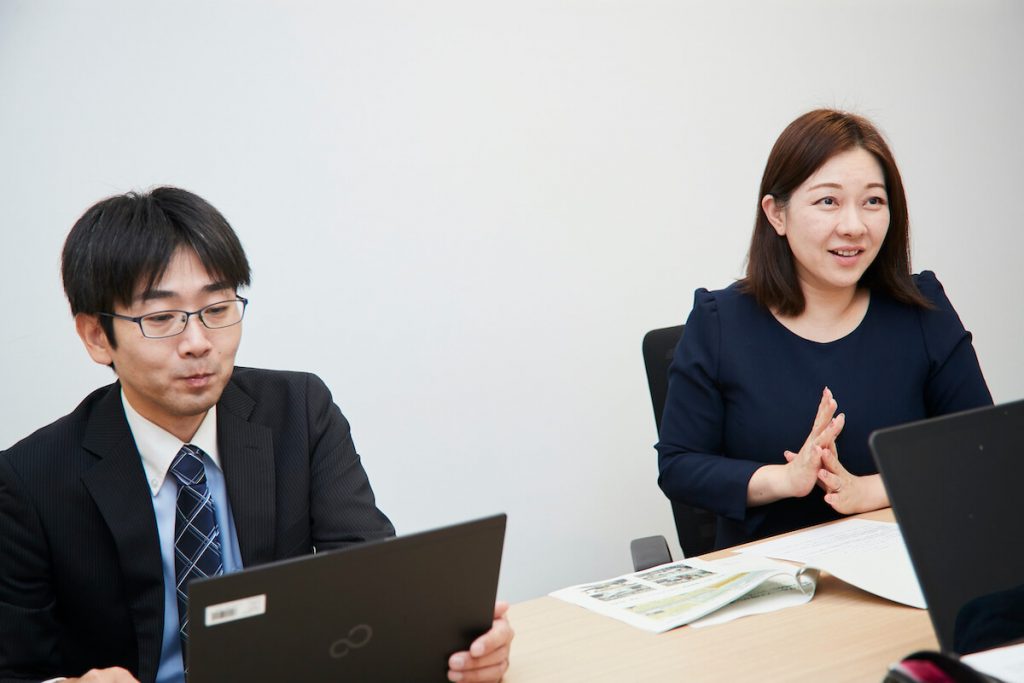
Yamada: Ms. Ikeda, what do you feel is necessary for promoting the employment of people with disabilities in society as a whole in the future?
Ms. Ikeda: A good place to start perhaps would be efforts to make leaders at the helm of companies aware of how common disabilities are. Executives at our company are currently proactively promoting diversity and inclusion, including initiatives in LGBTQ*, but I know that this was not the case initially. I heard from predecessors of Diversity and Inclusion team that they held many discussions with our company’s executives to help them understand various situations and conditions in the world. Likewise, it is necessary for corporate leaders to develop an “awareness” in the same way as we do.
- * Acronym for lesbian, gay, bisexual, transgender, queer/questioning
Okuhira: As our final question, please tell us about future initiatives that you are passionate about.
Mr. Tanabe: When I moved to this department, my supervisor told me, “You are now going to the department that works for people. Work for everyone with the idea of making everyone happy.” Although there are still many issues to address, I want to create an organization where all employees can work with a sense of security.
Photo: Eizaburo Togawa



